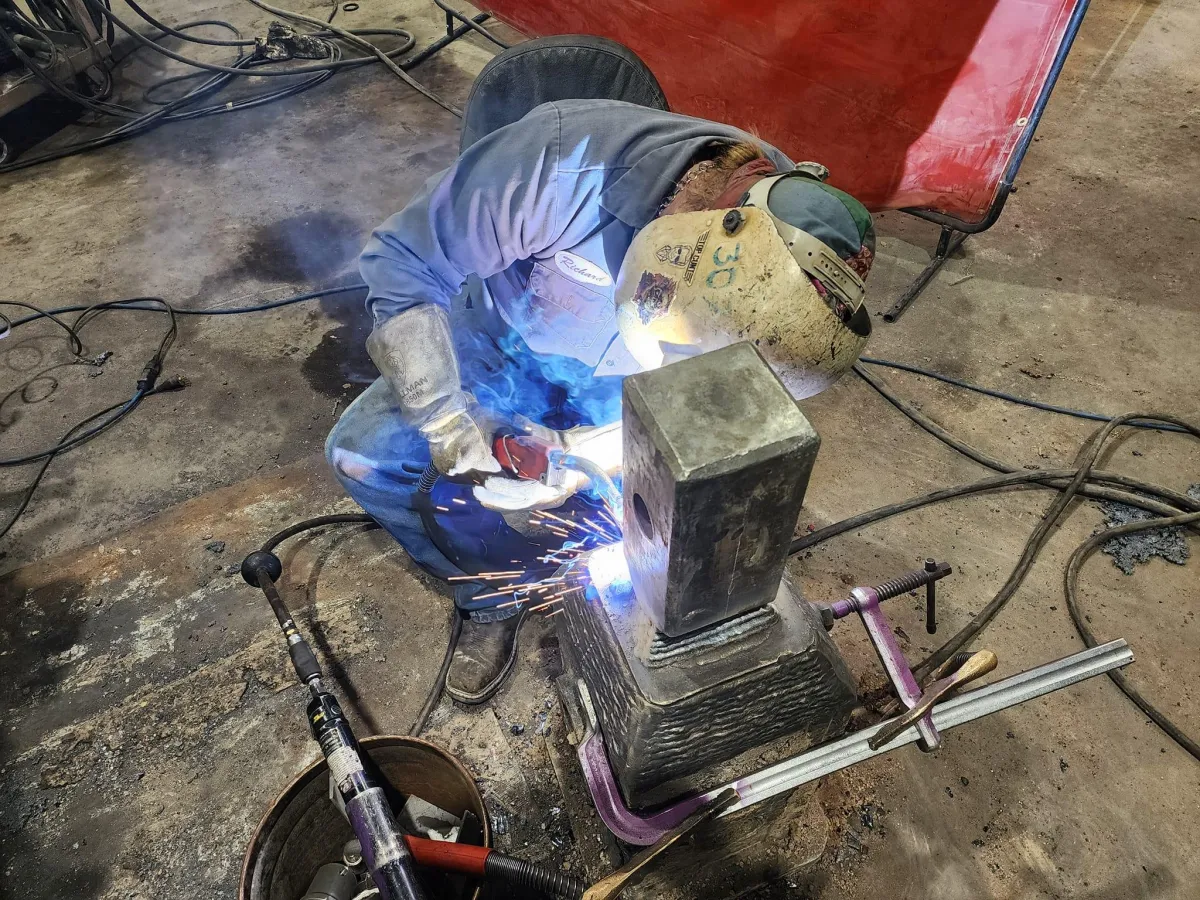blog

Stick Welding vs. MIG Welding: Which Is Best for On-Site Repair Work in Wyoming?
Dust, Wind, Rust — Not All Welds Are Built for the Field. Here's How We Choose the Right One.
You’ve got a trailer with a cracked frame or a gate with a broken hinge — and you’re out in Mills or Glenrock, hours from a full-service shop. Do you need fast MIG work, or is stick welding the better option in this case?
At Frontier Welding & Fabrication LLC, we offer both MIG and stick welding services — mobile and in-shop — and we choose the method based on your project’s material, location, and urgency. This blog compares the two so you know what to expect when we show up on-site.
What’s the Difference Between Stick and MIG Welding?
Both are used for steel welding, but they behave very differently in the field.
🔹 Stick Welding (SMAW):
Uses a consumable rod with flux coating
Doesn’t require external shielding gas
Performs well in wind, rain, and dirty conditions
Common for rugged structural and field repairs
🔹 MIG Welding (GMAW):
Uses a wire fed through a gun and shielding gas
Requires cleaner surfaces and minimal wind
Produces cleaner-looking welds with less slag
Common for trailers, frames, brackets, and mild steel
MIG vs. Stick: Side-by-Side Comparison
When Frontier Chooses Stick Welding in the Field
Stick welding is our go-to for:
Windy or wet conditions
Rusted or painted surfaces
Heavy-duty equipment repairs
Remote locations with limited prep tools
Structural repairs to gates, pipes, and posts
It’s especially reliable for rural repairs, agricultural jobs, and oilfield applications where conditions are unpredictable and speed isn’t the top priority.
When MIG Welding Makes More Sense
We use MIG in mobile settings when:
Surfaces are clean or easily prepped
There’s shelter from wind (e.g., garages, barns, enclosed areas)
You need faster production welding
A cleaner finish is preferred (e.g., visible welds on custom gates, equipment brackets, etc.)
In fact, MIG is often our default for in-shop jobs or scheduled repairs where conditions allow.
Why We Carry Both Methods in the Field
Because no two jobs — or two days in Wyoming — are the same.
Our mobile welding rigs come stocked with:
MIG and stick machines
Multiple rods and wire types
Portable gas tanks for MIG
Grinding, brushing, and prep tools
Safety gear and PPE for all environments
This way, we’re ready to pivot based on what the job demands — not what’s convenient.
FAQs – MIG vs. Stick for Mobile Welding
Is stick welding stronger than MIG?
Not always — strength depends more on the welder's skill and proper technique than the process. But stick performs better on dirty steel and in harsh conditions.
Can I get both done at the same location?
Yes — we often start with stick for base structure and finish with MIG where aesthetics or speed matters.
Is MIG better for aluminum?
Yes. MIG (with a spool gun) or TIG is required — stick welding isn’t used for aluminum.
Which method is cheaper?
Stick is often cheaper for emergency or simple structural repairs, while MIG offers better value for fabrication or repeat welding tasks.
Book Mobile Welding in Casper – MIG or Stick, We’ll Get It Done Right
Whether your trailer is broken down on a rural road or you’ve got equipment that needs fast reinforcement, Frontier brings both MIG and stick welding tools right to you. We assess the job, choose the right method, and get you rolling again.
📍 Serving Casper, Mills, Glenrock & the Surrounding Area
📞 Call Now to Book On-Site Welding Services
🔧 Or Request a Mobile Welding Estimate
Our Services
Helpful Links
Contact Information
5734 W Old Yellowstone Hwy Casper WY 82604
Business Hours
Mon - Sun 8:00 am - 5:00 pm
with 24/7 call-out services
© 2025 All Rights Reserved | Frontier Welding & Fabrication, LLC
